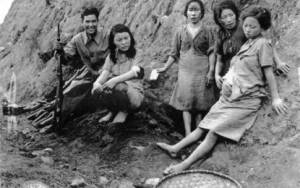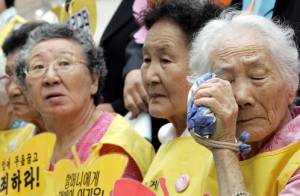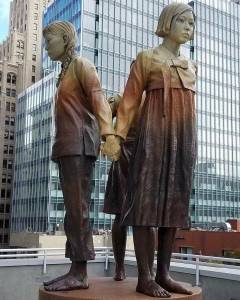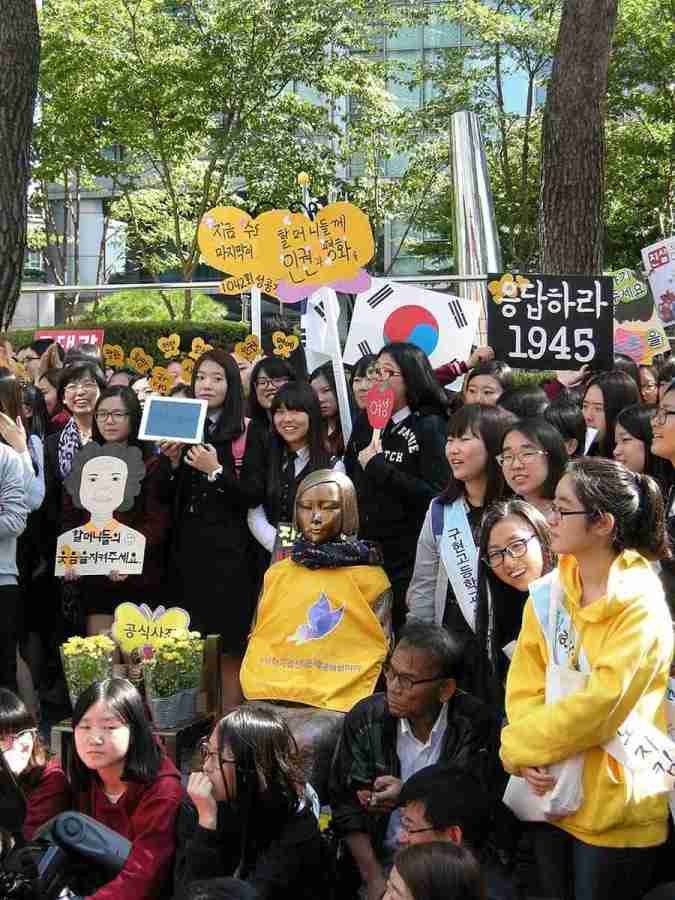My girlfriend Audrey, despite being born and raised in Seoul, had never witnessed the long-running weekly protest outside the Japanese Embassy. Somewhat more historically oriented, I had done so numerous times. I took a day off work and went with her on December 6, 2017.
Pyeonghwabi
Every Wednesday since 1992, a group of people has gathered at noon to remember and honor the roughly 200,000 Korean, Philippine, Taiwanese, Chinese, Thai, Malaysian, Burmese, Indonesian and Vietnamese women who were forced into sexual slavery by the Japanese during World War II. It’s an awful and sordid story that has been mishandled by the Japanese government from the first. They  stonewalled, denied and only reluctantly fessed up when courageous victims began to speak and documentary evidence proved what had happened. Pusillanimous apologies have been made in Japan’s Diet and at the United Nations to the dwindling number of survivors, and in December 2015 Prime Minister Shinzo Abe and Korean President Park Geun-hye signed an agreement wherein Japan would create a ¥1 billion (₩9.7 billion; $8.3 million) fund to support the surviving victims. One condition for that deal, from the Japanese perspective, was the removal of Pyeonghwabi, the golden bronze statue of a seated teenage girl who symbolizes the so-called comfort women. She has sat there, solemnly facing the Japanese Embassy, since 2011. Of course, the protests coalesce around her. The Japanese have issued their own protests numerous times in the last six years; they want Pyeonghwabi gone.
stonewalled, denied and only reluctantly fessed up when courageous victims began to speak and documentary evidence proved what had happened. Pusillanimous apologies have been made in Japan’s Diet and at the United Nations to the dwindling number of survivors, and in December 2015 Prime Minister Shinzo Abe and Korean President Park Geun-hye signed an agreement wherein Japan would create a ¥1 billion (₩9.7 billion; $8.3 million) fund to support the surviving victims. One condition for that deal, from the Japanese perspective, was the removal of Pyeonghwabi, the golden bronze statue of a seated teenage girl who symbolizes the so-called comfort women. She has sat there, solemnly facing the Japanese Embassy, since 2011. Of course, the protests coalesce around her. The Japanese have issued their own protests numerous times in the last six years; they want Pyeonghwabi gone.
If I have learned anything over the last decade, it is to tread carefully when the issue is Korean politics and social matters. What I see is often just on the surface, and other forces are operating below, swirling and colliding. Left-wingers, right-wingers, pro- and anti-North Korean people, those who want the Yankees out and those who dearly want them to stay—all these groups are constantly battling, trying to manipulate public opinion and government policy. There are some in Korea who think the “comfort women” issue has gone on long enough and needs to be gently concluded. Others, however, see something to be gained by continuing with the protests and leaving Pyeonghwabi right where she is. I am convinced that some, however, mean exactly what they say and have no hidden agenda.
The issue has been back in the news lately. Korean-Americans in San Francisco succeeded in convincing the city government to erect its own version of Pyeonghwabi. Japanese-Americans, of course, are not pleased. And no more than three weeks ago, Korea’s National Assembly voted to designate August 14 as a day to honor and remember the women who were so abused by the Japanese during World War II. (On August 14, 1991, Kim Hak-Sun became the first of the victims to go public with her story.)
Audrey and I were there for most of the one-hour event on this cold day. I had planned to show her how the shades of the windows of the Japanese Embassy were drawn, something I always considered fitting—eyes closed. But the red brick building had been razed, with the Embassy having been moved to temporary quarters nearby. There were speeches and chants (the gist of which seemed to be the Japanese’ insincerity, rage against their decades of denial and the inadequacy of compensation) and people holding banners. Maybe 150 were there, not including the two dozen policemen in black and green uniforms. Only 30 or so “comfort women” are still alive, and none were present at this gathering. At least half of the crowd consisted of middle school, high school and college-age females. Take note: there was a Japanese musician present who clearly stood with the victims of Emperor Hirohito and the military that served him.
While I support these protests—and abhor Japan’s cold-hearted refusal to fully own its crimes—, I feel compelled to look at a related matter. In the destitute years after the Korean War (1950−1953), a vast network of prostitution developed in camp towns, known as gijichon. Especially up near the demilitarized zone, you could find poor Korean women working in bars and brothels. Their clientele, if that term may be used, were mostly American soldiers. How this came about, it’s not easy to say. The national governments of Syngman Rhee and Park Chung-Hee, provincial governors, mayors, police, the military, gangsters, bogus job-placement agencies and other nefarious people all played a part. There were two goals: generating much-needed currency (25% of the country’s GDP in the early 1960s) and keeping the Americans happy. South Koreans had a palpable fear that, with combat over, the U.S. military would depart and leave them vulnerable to another invasion by Kim Il-Sung’s forces.
The miserable life of a prostitute, willing or otherwise
Some of the women went voluntarily, sure. Others were to some degree coerced or deceived. And once there, good luck getting out! In debt to pimps, they were subject to beatings if they did not “service” enough G.I.’s in a single day or if they tried to escape. This went on up through the 1980s, and in fact  there is still some of it today, although the women are more likely to be natives of the Philippines or Russia—as if that makes it any less repugnant.
there is still some of it today, although the women are more likely to be natives of the Philippines or Russia—as if that makes it any less repugnant.
The guilt of the Japanese during World War II is beyond doubt, at least in Korea. And sympathy for the so-called comfort women is universal. So this second group of victims has started to speak out, stating that the government had been involved in instituting and maintaining the camp town sex trade. They were commodities used to shore up the country’s struggling economy and to placate their ally, the United States. By what logic are they less worthy of compassion than those whom the Japanese forced into sexual slavery? While it was on a smaller scale and perhaps less brutal, this more recent set of horrors also deserves to be brought into the light of day. What may make it worse, however, is that the Japanese were outsiders, foreigners, who compelled Korean women to work as prostitutes, but this was Koreans doing much the same to their own. Hypocrisy, pure and simple. It’s hard to play the victim when one is also a victimizer.


Add Comment